
East Dunbartonshire is one of the 32 council areas of Scotland. It borders the north of Glasgow and contains many of the affluent areas to the north of the city, including Bearsden, Milngavie, Balmore and Torrance, as well as many of the city's commuter towns and villages. East Dunbartonshire also shares borders with North Lanarkshire, Stirling and West Dunbartonshire. The council area covers parts of the historic counties of Dunbartonshire, Lanarkshire and Stirlingshire.
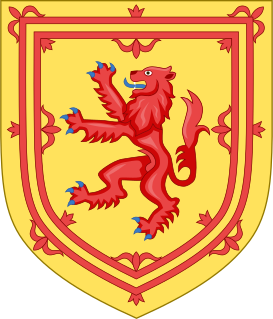
Local government in Scotland comprises thirty-two local authorities, commonly referred to as Scottish councils. Each council provides public services, including education, social care, waste management, libraries and planning. Councils receive the majority of their funding from the Scottish Government, but operate independently and are accountable to their local electorates. Councils raise additional income via the Council Tax, a locally variable domestic property tax, and Business rates, a non-domestic property tax.

Scottish Labour is a social democratic political party in Scotland. It is an autonomous section of the UK Labour Party. From their peak of holding 56 of the 129 seats at the first Scottish parliament election in 1999, the Party has lost seats at each Holyrood election, returning 22 MSPs at the 2021 election. The party currently holds one of 59 Scottish seats in the UK House of Commons, with Ian Murray having represented Edinburgh South continuously since 2010.

Dumbarton is a constituency of the Scottish Parliament (Holyrood) covering parts of the council areas of Argyll and Bute and West Dunbartonshire. It elects one Member of the Scottish Parliament (MSP) by the first past the post method of election. It is also one of ten constituencies in the West Scotland electoral region, which elects seven additional members, in addition to the ten constituency MSPs, to produce a form of proportional representation for the region as a whole.
Jim Bollan is a councillor in West Dunbartonshire, representing the West Dunbartonshire Community Party. Until 2016 he was a member of the Scottish Socialist Party (SSP), having been the only elected representative from that party left in Scotland.
The East Dunbartonshire Independent Alliance was a minor political party operating in East Dunbartonshire, Scotland, represented on East Dunbartonshire Council until October 2012 by Jack Young, one of the three councillors for Kirkintilloch East & Twechar, and until July 2012 by Charles Kennedy, one of the three councillors for Campsie & Kirkintilloch North.
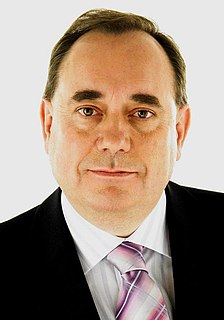
The 2012 Scottish local elections, were held on 3 May 2012 in all 32 local authorities. The Scottish National Party (SNP) overtook Labour to win the highest share of the vote, and retained and strengthened its position as the party with most councillors. Labour also made gains, while the Liberal Democrats experienced meltdown, losing over half their seats and falling behind the Conservatives. For the first time since the introduction of the Single Transferable Vote system, the SNP won majority control of 2 councils, from no overall control. Labour also won majority control of 2 councils from no overall control, while retaining majority control over 2 councils.
This article documents the strengths of political parties in the 333 local authorities of England, 32 local authorities of Scotland, 22 principal councils of Wales and 11 local councils of Northern Ireland.
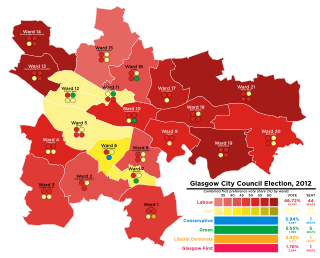
Elections to Glasgow City Council were held on 3 May 2012, the same day as the other Scottish local government elections. The election was the second using 21 new wards created as a result of the Local Governance (Scotland) Act 2004, each ward elected three or four councillors using the single transferable vote system form of proportional representation.

Elections to West Dunbartonshire Council were held on 3 May 2012 on the same day as the 31 other local authorities in Scotland. The election used the six wards created under the Local Governance (Scotland) Act 2004, with 22 Councillors being elected. Each ward elected either 3 or 4 members, using the STV electoral system.
Elections to East Dunbartonshire Council were held on 3 May 2012, the same day as the 31 other local authorities in Scotland. The election used the eight wards created under the Local Governance (Scotland) Act 2004, with 24 Councillors being elected. Each ward elected 3 members, using the STV electoral system.
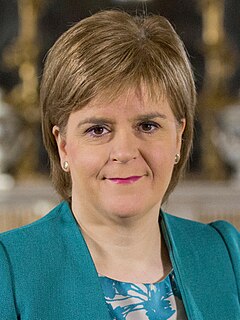
The 2017 Scottish local elections were held on Thursday 4 May, in all 32 local authorities. The SNP retained its position as the largest party in terms of votes and councillors, despite suffering minor losses. The Conservatives made gains and displaced Labour as the second largest party, while the Liberal Democrats suffered a net loss of councillors despite increasing their share of the vote. Minor parties and independents polled well; and independent councillors retained majority control over the three island councils. For the first time since the local government reforms in 1995, all mainland councils fell under no overall control.
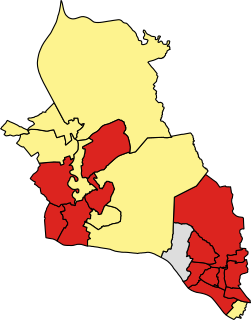
The 1995 elections to West Dunbartonshire Council were held on the 6 April 1995 and were the first for the newly formed unitary authority, which was created under the Local Government etc (Scotland) Act 1994 and replaced the previous two-tier system of local government under Strathclyde Regional Council and Dumbarton and Clydebank District Councils.
The 2017 West Dunbartonshire Council election was held on Thursday 4 May 2017, on the same day as the 31 other local authorities in Scotland. The election used the six wards created under the Local Governance (Scotland) Act 2004, with 22 Councillors being elected. Each ward will elect either 3 or 4 members, using the STV electoral system.
Elections for the City of Glasgow District Council took place on 3 May 1977, alongside elections to the councils of Scotland's various other districts. These were the second election to the City of Glasgow District Council, and saw Labour losing their control of the council, losing nearly half of their councillors. Among the losing councillors was Dick Dynes, the Labour group leader. Dynes was replaced as leader by Jean McFadden.

The Glasgow City Council election of 2017 was held on 4 May 2017, the same day as the 31 other Scottish local government elections. The election was the first to use 23 new wards, created as a result of the Local Government Boundary Commission for Scotland's 5th Review. Each ward elected three or four councillors using the single transferable vote system, a form of proportional representation used since the 2007 election and according to the Local Governance (Scotland) Act 2004.
Elections to East Dunbartonshire Council were held on Thursday 4 May, the same day as the 31 other local authorities in Scotland. The election used seven wards created under the Local Governance (Scotland) Act 2004, a reduction of one from 2012, with 22 Councillors being elected, 2 fewer overall. Each ward elected either 3 or 4 members, using the STV electoral system.

Canal is one of the 23 wards of Glasgow City Council. Since its creation in 2007 it has returned four council members, using the single transferable vote system. For the 2017 Glasgow City Council election, the boundaries were changed and the ward decreased in population, but continued to return four councillors.
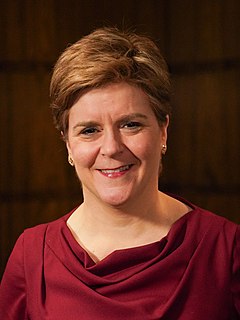
The 2022 Scottish local elections were held on 5 May 2022, as part of the 2022 United Kingdom local elections. All 1,227 seats across all 32 Scottish local authorities were up for election and voter turnout was 44.8%.
The 2022 West Dunbartonshire Council election was held on Thursday 5 May 2022, on the same day as the 31 other local authorities in Scotland. The election used the six wards created under the Local Governance (Scotland) Act 2004, with 22 councillors being elected. Each ward elected either 3 or 4 members, using the STV electoral system.











